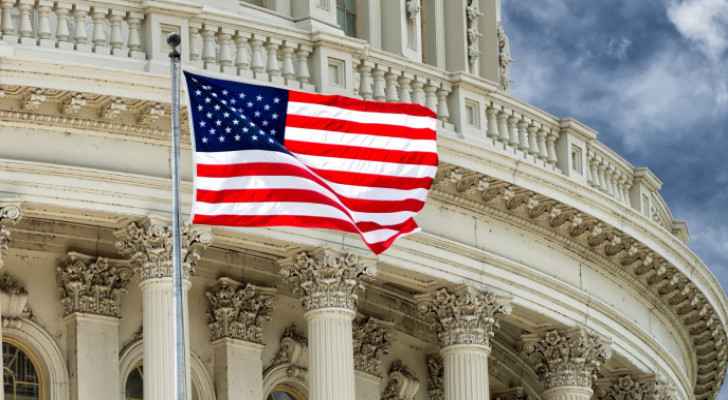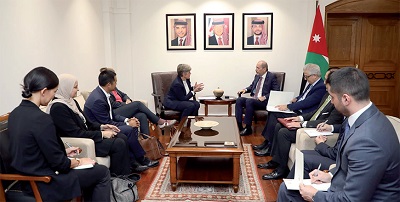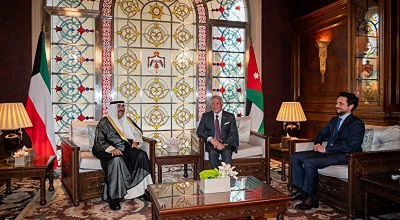Trump’s phone calls, state visits and back channel diplomacy - By Dr. Mohamed Ramady, Al Arabiya
President Trump’s style of communicating policy and interacting with world leaders has left many scratching their heads and having to quickly adjust in how to reach out to the new and unconventional President. These seem to involve various degrees of perceived importance.
The most important, it seems, are the early personal visits by invited foreign heads of state to the White House to assess where a country’s relationship is heading, renewing “special undying bonds” and alliances such as the UK’s Premier May. It could also end up being a diplomatic nightmare given the last minute unscripted style of the new US president, as Netanyahu found out during his joint press conference when he least expected to be told to “hold off for a little bit more” on the settlement drive in occupied Palestine.
However, if managed properly, such visits can also go very well as evidenced by the visit of Deputy Crown Prince Mohammed bin Salman’s visit to the White House. The pitfall of this mode of diplomacy is the issue of “the handshake” between the leaders: will it be long and vigorous (Japan’s Abe), deftly managed and equal (Canada’s Trudeau) or none at all (Germany’s Merkel)?
The second mode is the Trump telephone call to heads of state, with importance attached on which head of state he is dialling first in the queue. But again one is not sure if the dialled party has got what was hoped for from the call, given that a “great call” might soon be followed by off the cuff remarks that set relations back to nil, with Mexico and “the wall” being a good example.
The third is the use of his immediate and extended family, particularly his daughter Ivanka, his sons Eric and Don Jr, and his son-in-law Jared Kushner, to carry out back channel diplomacy, something that has raised diplomatic eyebrows and frantic catch up by the traditional diplomatic careerist in Foggy Bottom, as the State Department is fondly called.
This particular mode of passing backhand messages seems to fit in well with a president who espouses the power of deal making and business relations in solving corporate and inter-state problems, and seems to be the favored mode for countries that are transactional oriented and want to get close to Trump like China, Russia and the Middle East.
Given the rich and varied menu in approaching President Trump, why should anyone be upset? It depends on the style and confidence level of foreign leaders. While some will fawn over the US President, others welcome a person-to-person visit to give them a chance to put, rather more forcefully, their opposing viewpoints, but it takes a few brave souls to do this and Germany’s Angela Merkel is one.
Merkel’s argument
In her recent visit to the White House, the German Chancellor Angela Merkel warned US President Donald Trump that a proposed tax overhaul could spark retaliatory measures, including higher tariffs for American companies, and that the German government is reviewing its responses to a border-adjustment tax, which would only tax US corporations’ imports and not their exports.
Merkel argues that this violates World Trade Organization rules, unless President Trump does not care about this institution too, and adds it to those such as the Climate Change pacts. Again, unlike Teresa May and Benjamin Netanyahu who desperately sought US goodwill for their particular circumstances back home, a few countries have some leverage in their discussions.
Merkel riposte could include incrementally higher duties on imports from America and allowing German companies to make their US import tax deductible, thus compensating their competitive disadvantage, according to the report. Germany could also consider lowering corporate taxes and social contributions, making itself more attractive to international companies.
For Merkel, defending Germany’s export-based economic model is key as she seeks to boost her party’s poll numbers and win a fourth term in September, and playing tough with Trump might go down well and set her apart from others as a strong leader. The result, however, was the rather awkward and stiff poses of the two leaders following their meetings, with their body language saying it all.
The back door channel of reaching out is probably easier to explore, given that the second approach – the telephone call – reveals little public information on what was actually discussed, and often ends up having two different versions on what took place, with some items “sexed up” and others omitted or downplayed for the benefit of the respective domestic constituencies. However, sometimes a modest call is better than none and could end up being a “very good call”.
Call to China
Chinese officials were pleasantly surprised by President Donald Trump’s decision to reach out to President Xi Jinping with a personal call on February 9, a mere two weeks after failing to reach an agreement in a previously undisclosed back channel call on January 26 just before the start to the Chinese New Year.
In this first call, the two leaders mainly covered trade and economic cooperation, though they did briefly touch on sensitive geopolitics issues, including Taiwan, South and East China Sea tensions, and Sino-US security and military cooperation and exchanges. The two leaders also touched briefly on Iran, North Korea, and Syria, and stressed the need to work together on terrorism, but did not touch on any thorny human rights issues.
However, China won an important battle on 9 February with this telephone diplomacy as President Trump appeared to drop his threat to abandon Washington’s One China policy, which would have meant recognition of Taiwan, a red line for Beijing.
Awareness that personal relationships hold more gravity than policy positions has only made it more critical to get access, especially back channel. The priority for every ambassador in Washington and every visiting minister seems to be seeking an audience with either son-in-law Kushner, preferably daughter Ivanka, or Steve Bannon, Trump’s chief strategist.
Some governments have sought to curry favor by doing business with the Trump organization. Following the disastrous president-to-president Mexico telephone call, the message has not been lost on the Mexicans to try the backhand channel.
The Mexican minister, Luis Videgarary, went straight to the unofficial and unelected center of power bypassing Foggy Bottom and the new Secretary of State Rex Tillerson, and reached out to the president’s son-in-law Jared Kushner. Videgaray, and Kushner knew each other in the business world, a hallmark of the Trump era, in which business networks have vied with national interests and the personal has become geopolitical.
Rest of the world
The rest of the world has been quick to learn. Not to be outdone, the Chinese embassy has played host to Kushner, Ivanka Trump and their children, celebrating the Chinese New Year, at a time when the Kushner family business was pursuing property dealings with a major Chinese corporation.
What followed was maybe coincidental, but China granted 38 new intellectual property name trademarks to the Trump organization paving the way in theory for the family business to enter – or stop others from entering – a wide array of businesses, from insurance to hotels, bodyguards, and personal services.
Intellectual property experts were struck by how smoothly the whole process went through the Chinese bureaucracy, and pointed to likely intervention from on high in the Communist party hierarchy. In a sign of the times, a company owned by the family of Jared Kushner, stands to receive more than $400 million from a prominent Chinese company Anbang that is investing in the Kushners’ $4 billion Manhattan office tower at 666 Fifth Ave.
Kushner has become something of a de facto envoy for the administration on China, and was present for a meeting between Yang Jiechi, China’s top diplomat, and his father-in-law at the end of February. There are discussions under way between China and the US on a potential summit between Trump and Chinese President Xi Jinping to take place as early as next month.
In the Middle East, the Trump family has been busy when on 17 February President Trump’s sons, Eric and Don Jr, were the guests of honour to the launch of the Trump International Golf Club in Dubai. It was the first opening of a Trump-branded property in the Gulf since the president’s inauguration, illuminating how much his business interests are thriving.
However, some have pointed out that there could be potential conflicts of interests that could open the US President up to foreign influence, since while he has given control of his global empire to his children, Trump has not divested his ownership, which means he will benefit from any commercial success of the golf resort.
The Dubai development was built by DAMAC Properties, which signed a multimillion-dollar branding and management contract with Trump’s company to operate the golf resort. For Russia, the personal approach seems to have backfired badly, at least for the time being, as every contact with the Trump camp and any evidence of financial entanglement has become a threat to the president’s legitimacy and his support among congressional Republicans.
Trump himself has been forced to backpedal from earlier suggestions he would lift sanctions, go soft on Moscow’s military intervention in Ukraine and find common cause with Russia in Syria.
So which communication option will foreign heads of state opt for, given the short and long-term positive and negative impact of each? The response to date however, given the institutional and policy turmoil in Washington, has been one of confusion but expect the same for the next four years.
Latest News
Most Read Articles
- Safadi discusses support to Syrian refugee with DRC
- King, Kuwait emir reaffirm pride in deep-rooted relations
- Israeli Occupation aggression on Gaza enters 200th day
- UNRWA’s role in Gaza indispensable — Foreign Ministry
- Jordan condemns Israeli 'war crimes' in Gaza, calls for accountability
- Baby delivered from dying mother's womb in Gaza 'miracle'
- General Motors lifts 2024 profit forecast after strong Q1
- Kuwait channels $24 billion in development assistance to Jordan in 24 years
- Azerbaijan says ‘closer than ever’ to Armenia peace deal amid border talks
- King orders holding parliamentary elections in accordance with law, checks on electoral commission’s preparations




